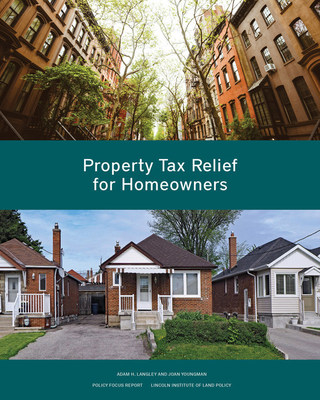Subjects: NPT, SVY, ESG
Targeted Property Tax Relief Needed to Help Taxpayers and Protect Local Services, Report Finds
CAMBRIDGE, Mass., Nov. 3, 2021 /PRNewswire/ -- Amid rising home values, cities and states need to provide targeted relief to keep property taxes affordable while avoiding overly broad measures that could undermine the largest source of local revenue, a new report finds.
In the Policy Focus Report Property Tax Relief for Homeowners, Lincoln Institute scholars Adam Langley and Joan Youngman evaluate more than a dozen common tools for tax relief and explain how state and local policy makers can keep tax systems fair and fiscally sustainable. They recommend a mix of sound tax administration, highly targeted relief, and robust state funding.
"An approach that includes policies such as circuit breakers, deferrals, sound assessment and collection practices, and well-designed state aid formulas will promote a tax system that is fair and affordable for taxpayers while providing the revenue needed to maintain quality public services," the authors write.
The report addresses a challenging aspect of the property tax: higher home values do not always equate to greater cash flow for homeowners. Thus, keeping tax bills stable is essential.
In an attempt to provide stability, states sometimes enact ineffective measures that destabilize state and local budgets, reduce the quality of public services, and deliver disproportionate benefits to wealthier homeowners. The most common among these are far-reaching limits on local tax rates, revenues, and taxable property values.
"All state-imposed tax limits reduce local control over budget decisions, and so diminish the capacity of local governments to respond to taxpayer preferences and changing circumstances," Langley and Youngman write.
Instead, policy makers can employ targeted approaches that keep tax bills as stable as possible and provide relief to those who need it.
Regular and accurate assessment of property is critical. Without it, assessed values stay artificially low until they eventually spike after a long-delayed revaluation. Further, if property values increase faster than incomes, policy makers need to reduce tax rates accordingly to stabilize tax bills.
While sound assessment and rate-setting practices go a long way to prevent financial hardship, targeted tax relief is needed to support some homeowners, such as seniors with fixed incomes, people who have lost their jobs, or lower-income residents of gentrifying neighborhoods, whose property tax bills are still growing relative to their income.
Langley and Youngman recommend circuit breakers, which provide property tax relief to those whose tax bill exceeds a certain percentage of income?so named because they function like a switch that cuts off an electrical circuit when too much current flows. They also recommend deferrals, which delay taxes until the property changes hands, enabling homeowners or their heirs to use proceeds from the sale of the home to pay off the taxes. Finally, they recommend monthly payment options so that homeowners do not face a large bill once or twice per year.
While cities and towns can administer such programs, states play a critical role. They need to remove legal barriers that prevent local governments from effectively administering the property tax and provide robust aid to make up for gaps in real estate values among different cities and towns. Adequate state funding ensures that even low-wealth jurisdictions can provide quality local services at affordable tax rates.
"If policy makers are sincere about providing targeted property tax relief for homeowners that has the fewest unintended or spillover effects, they would benefit from serious study of the concepts and approaches presented in this report," said Alan Dornfest, property tax bureau chief for the Idaho State Tax Commission. "It could not be more timely or more complete."
The report is available for download at no cost on the Lincoln Institute's website: https://www.lincolninst.edu/publications/policy-focus-reports/property-tax-relief-homeowners.
The Lincoln Institute of Land Policy seeks to improve quality of life through the effective use, taxation, and stewardship of land. A nonprofit private operating foundation whose origins date to 1946, the Lincoln Institute researches and recommends creative approaches to land as a solution to economic, social, and environmental challenges. Through education, training, publications, and events, we integrate theory and practice to inform public policy decisions worldwide.
SOURCE Lincoln Institute of Land Policy
These press releases may also interest you
|
News published on and distributed by:




